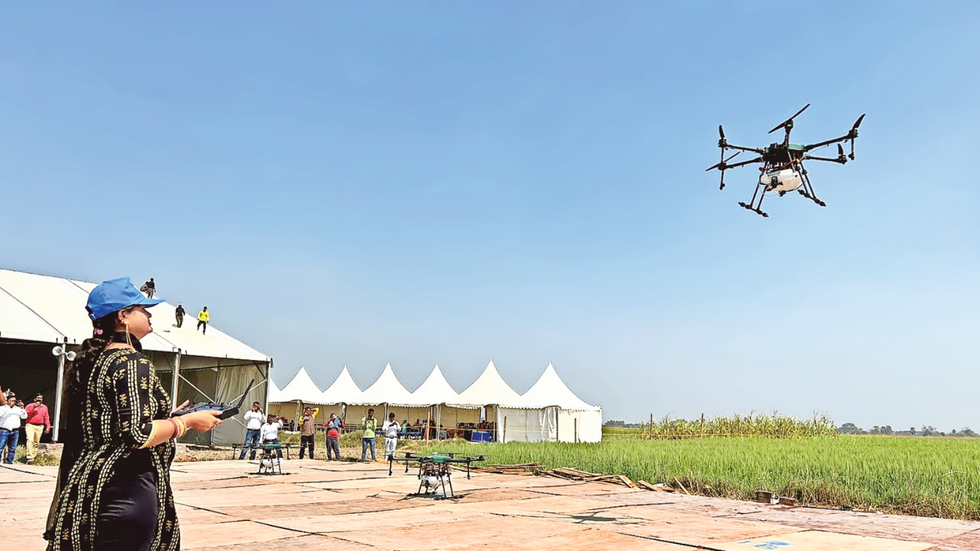The Government of India has approved the Namo Drone Didi scheme aimed at empowering Women Self Help Groups (SHGs) under the Deendayal Antyodaya Yojana – National Rural Livelihood Mission (DAY-NRLM). With an outlay of ₹1261 crores, the scheme is set to provide drones to 14,500 selected Women SHGs between 2024-25 and 2025-2026. The primary objective is to enable these groups to offer rental services to farmers for agricultural applications, including the use of liquid fertilizers and pesticides.
Objectives of the Scheme
- Empower Women SHGs: To facilitate economic independence through drone rental services.
- Enhance Agricultural Efficiency: By using drones for precise application of fertilizers and pesticides.
- Sustainable Livelihoods: Providing an additional source of income for women.
Operational Guidelines
The Department of Agriculture & Farmers’ Welfare has released operational guidelines to ensure effective implementation of the scheme. Key components include:
Governance Structure
- Central Level Oversight: An Empowered Committee of Secretaries from relevant departments will govern the scheme.
- Implementation and Monitoring Committee: Headed by the Additional Secretary of the Department of Rural Development, this committee will oversee planning, implementation, and technical guidance.
Financial Assistance
- Subsidy: Women SHGs will receive 80% central financial assistance for the cost of drones and accessories, capped at ₹8 lakhs.
- Loan Facility: SHGs can secure loans for the balance amount through the National Agriculture Infra Financing Facility (AIF), with an interest subvention of 3%.
Drone Package Details
The drone package includes:
- A basic drone equipped with a spray assembly for liquid fertilizers and pesticides.
- Additional equipment such as battery sets, a downward-facing camera, and a pH meter.
- Comprehensive training for drone pilots and assistants.
- Insurance and maintenance contracts.
Training and Capacity Building
- One member from each SHG will undergo 15 days of mandatory training as a drone pilot, while another will be trained as a drone assistant.
- Training will focus on drone operation and agricultural applications.
Implementation Agencies
- Lead Fertilizer Companies (LFCs) will act as implementing agencies at the state level, coordinating with various stakeholders to ensure efficient execution.
- Drones will be procured through a transparent process, with ownership resting with the SHGs or their federations.
Monitoring and Evaluation
- An IT-based Management Information System (MIS), referred to as the Drone Portal, will facilitate monitoring, fund disbursement, and track drone operations.
Expected Outcomes
The Namo Drone Didi scheme aims to:
- Provide sustainable business opportunities for Women SHGs.
- Enhance agricultural productivity through advanced technology.
- Reduce operational costs for farmers.
Multiple-Choice Questions (MCQs):
- What is the total outlay approved for the Namo Drone Didi scheme?
- A) ₹500 Crores
- B) ₹1000 Crores
- C) ₹1261 Crores
- D) ₹1500 Crores
Answer: C) ₹1261 Crores
- How many Women SHGs are targeted to benefit from the scheme?
- A) 10,000
- B) 14,500
- C) 20,000
- D) 25,000
Answer: B) 14,500
- What percentage of Central Financial Assistance is provided for the purchase of drones?
- A) 50%
- B) 60%
- C) 70%
- D) 80%
Answer: D) 80%
- Which committee will be responsible for monitoring the implementation of the Namo Drone Didi scheme?
- A) State Committee
- B) Empowered Committee of Secretaries
- C) Implementation and Monitoring Committee
- D) National Committee for Agriculture
Answer: C) Implementation and Monitoring Committee
- What kind of training will members of the SHGs receive?
- A) Basic Computer Training
- B) Drone Pilot Training and Agricultural Application Training
- C) First Aid Training
- D) Financial Management Training
Answer: B) Drone Pilot Training and Agricultural Application Training
